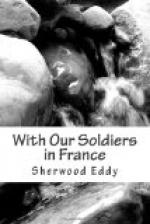Away there in Austria a young crown prince, Francis Ferdinand, was murdered. It was the spark which set off the powder mine of Europe. But not for him are they fighting. Behind him stood the two contending forces of the growing nationalism of Serbia and the expanding commercialism of Austria. These two forces clashed in conflict, but not for them are they fighting. Behind these stood two greater powers, those of pan-Germanism and pan-Slavism, a growing Germany and a rising Russia, which like a vast glacier for a thousand years had sought the open sea. The ambitions of these two powers clashed in conflict at Constantinople and elsewhere. But not for them are they fighting.
On the western front there were two deeper principles in conflict, those of autocracy and democracy, the question whether one man and a sinister, hidden group of plotting militarists could drag the whole world into war and crush its liberties and its laws beneath the iron heel of despotism, or whether man as man should stand erect in his God-given right of freedom and work out his own destiny in friendly brotherhood.
But behind even the great conflict between autocracy and democracy lay a yet deeper issue. In the last analysis the final question in human life is between a material and a spiritual interpretation of the universe, whether might makes right and the strong are to rule, or whether right makes might and the moral order is supreme. There is a material and a spiritual side of life. On this side is the brute struggle for life; on that, the struggle for the life of others; on the one hand, the fight for the survival of the fittest, and on the other, the fight to make men fit to survive. On the left hand is selfishness and on the right service; on the one side are the red battlefields of the enemy, and on the other is a cross red in sacrifice of a life laid down in the serving and saving of men. There is a final issue in the world between passion and principle, between wrong and right, between darkness and light, between mammon and God, between self and Christ.
This ultimate issue must be faced by individuals and by nations. It is the challenge which confronts men in this war. Seventy years ago a crushed Europe faced the issue in the prophetic words of Mazzini, written in the hour of darkness and defeat:
“Our victory is certain; I declare it with the profoundest conviction, here in exile, and precisely when monarchical reaction appears most insolently secure. What matters the triumph of an hour? What matters it that by concentrating all your means of action, availing yourselves of every artifice, turning to your account those prejudices and jealousies of race which yet for a while endure, and spreading distrust, egotism, and corruption, you have repulsed our forces and restored the former order of things? Can you restore men’s faith in it, or think you can long maintain it by brute force alone, now that all faith in it is extinct? Threatened and undermined on every side, can you hold all Europe forever in a stage of siege?” [1]




